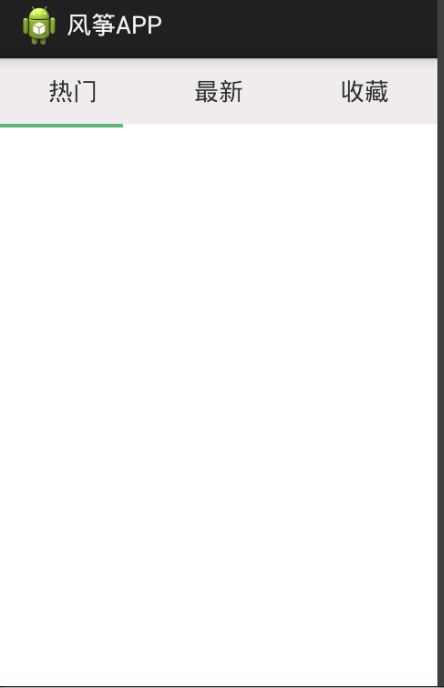使用ViewPager+Fragment实现选项卡切换效果
实现效果
本实例主要实现用ViewPage和Fragment实现选项卡切换效果,选项卡个数为3个,点击选项卡或滑动屏幕会切换Fragment并实现选项卡下方下边框条跟随移动效果。
本程序用android4.2.2真机调试,为方便部署,我使用adbWireless做为部署工具,电脑和手机接入同一局域网,在PC端输入名称adb connect 手机端ip 默认连接5555端口。之后再Eclipse的Devices中即可看到介入设备。前提是android系统需要Root。如下图:
设计实现
- 创建项目(此过程不做赘述)
在activity_main.xml中设置布局。xml内容如下:
<LinearLayout xmlns:android="http://schemas.android.com/apk/res/android" xmlns:tools="http://schemas.android.com/tools" android:layout_width="match_parent" android:layout_height="match_parent" android:orientation="vertical" tools:context="com.example.fengzhengapp.MainActivity" > <LinearLayout android:layout_width="match_parent" android:layout_height="48dp" android:orientation="horizontal" > <TextView android:id="@+id/tv_hot" android:layout_width="wrap_content" android:layout_height="fill_parent" android:layout_weight="1.0" android:background="#ffEAEAEA" android:gravity="center" android:text="@string/tab_hot" android:textSize="18sp" /> <TextView android:id="@+id/tv_news" android:layout_width="wrap_content" android:layout_height="fill_parent" android:layout_weight="1.0" android:background="#ffEAEAEA" android:gravity="center" android:text="@string/tab_news" android:textSize="18sp" /> <TextView android:id="@+id/tv_fav" android:layout_width="wrap_content" android:layout_height="fill_parent" android:layout_weight="1.0" android:background="#ffEAEAEA" android:gravity="center" android:text="@string/tab_favorite" android:textSize="18sp" /> </LinearLayout> <ImageView android:id="@+id/cursor" android:layout_width="wrap_content" android:layout_height="wrap_content" android:scaleType="matrix" android:src="@drawable/bgborder" /> <android.support.v4.view.ViewPager android:id="@+id/myViewPager" android:layout_width="match_parent" android:layout_height="0dp" android:layout_weight="1" android:flipInterval="30" > </android.support.v4.view.ViewPager> </LinearLayout>上面布局页实现的效果如下:

接下来,增加3个Fragment布局页 ,分别在里面填充简单的内容
第一个:<?xml version="1.0" encoding="utf-8"?> <LinearLayout xmlns:android="http://schemas.android.com/apk/res/android" android:layout_width="match_parent" android:layout_height="match_parent" android:orientation="vertical" > <TextView android:id="@+id/txtHot" android:layout_width="match_parent" android:layout_height="match_parent" android:layout_weight="1" android:text="this is the hot tab" > </TextView> </LinearLayout>第二个:
<?xml version="1.0" encoding="utf-8"?> <LinearLayout xmlns:android="http://schemas.android.com/apk/res/android" android:layout_width="match_parent" android:layout_height="match_parent" android:orientation="vertical" > <TextView android:id="@+id/txtNews" android:layout_width="match_parent" android:layout_height="match_parent" android:layout_weight="1" android:text="this is the news tab" > </TextView> </LinearLayout>第三个:
以上3个Fragment的布局文件已创建完毕,每个文件中只显示简单的文本内容,用做演示。<?xml version="1.0" encoding="utf-8"?> <LinearLayout xmlns:android="http://schemas.android.com/apk/res/android" android:layout_width="match_parent" android:layout_height="match_parent" android:orientation="vertical" > <TextView android:id="@+id/txtFav" android:layout_width="match_parent" android:layout_height="match_parent" android:layout_weight="1" android:text="this is the Fav tab" > </TextView> </LinearLayout>加载3个Fragment到Activity中。
首先实现3个Fragment对应的后台类
热点布局页对应的类:
import android.os.Bundle;
import android.support.v4.app.Fragment;
import android.view.LayoutInflater;
import android.view.View;
import android.view.ViewGroup;
public class FragmentHot extends Fragment {
@Override
public View onCreateView(LayoutInflater inflater, ViewGroup container,
Bundle savedInstanceState) {
View view = inflater.inflate(R.layout.fragmenthot, container, false);
return view;
}
}news布局页对应的类:
import android.os.Bundle;
import android.support.v4.app.Fragment;
import android.view.LayoutInflater;
import android.view.View;
import android.view.ViewGroup;
public class FragmentNews extends Fragment {
@Override
public View onCreateView(LayoutInflater inflater, ViewGroup container,
Bundle savedInstanceState) {
View view = inflater.inflate(R.layout.fragmentnews, container, false);
return view;
}
}收藏布局页对应的类:
import android.os.Bundle;
import android.support.v4.app.Fragment;
import android.view.LayoutInflater;
import android.view.View;
import android.view.ViewGroup;
public class FragmentFavorite extends Fragment {
@Override
public View onCreateView(LayoutInflater inflater, ViewGroup container,
Bundle savedInstanceState) {
View view = inflater.inflate(R.layout.fragmentfav, container, false);
return view;
}
}之后再activity中初始化这3个Fragment
注意要点:
Activity继承自FragmentActivity
要实现一个FragmentPagerAdapter,内容如下:import java.util.ArrayList; import android.support.v4.app.Fragment; import android.support.v4.app.FragmentManager; import android.support.v4.app.FragmentPagerAdapter; public class MyFragmentAdapter extends FragmentPagerAdapter { ArrayList<Fragment> list; public MyFragmentAdapter(FragmentManager fm,ArrayList<Fragment> list){ super(fm); this.list = list; } @Override public Fragment getItem(int arg0) { // TODO Auto-generated method stub return list.get(arg0); } @Override public int getCount() { // TODO Auto-generated method stub return list.size(); } }然后在Activity中实现切换和动画效果,代码如下:
import java.util.ArrayList; import android.app.Activity; import android.graphics.BitmapFactory; import android.graphics.Matrix; import android.os.Bundle; import android.support.v4.app.Fragment; import android.support.v4.view.ViewPager; import android.support.v4.view.ViewPager.OnPageChangeListener; import android.util.DisplayMetrics; import android.util.Log; import android.view.Menu; import android.view.View; import android.support.v4.app.FragmentActivity; import android.view.MenuItem; import android.view.animation.Animation; import android.view.animation.TranslateAnimation; import android.widget.ImageView; import android.widget.TextView; import android.widget.Toast; public class MainActivity extends FragmentActivity { private ViewPager mViewPager; private ArrayList fragments; private TextView view1, view2, view3; private int currIndex; private ImageView image; private static int bmpW;//横线图片宽度 private static int offset;//图片移动的偏移量 @Override protected void onCreate(Bundle savedInstanceState) { super.onCreate(savedInstanceState); setContentView(R.layout.activity_main); initViewPager(); InitTextView(); InitImage(); } @Override public boolean onCreateOptionsMenu(Menu menu) { // Inflate the menu; this adds items to the action bar if it is present. getMenuInflater().inflate(R.menu.main, menu); return true; } @Override public boolean onOptionsItemSelected(MenuItem item) { // Handle action bar item clicks here. The action bar will // automatically handle clicks on the Home/Up button, so long // as you specify a parent activity in AndroidManifest.xml. int id = item.getItemId(); if (id == R.id.action_settings) { return true; } return super.onOptionsItemSelected(item); } private void InitTextView(){ view1 = (TextView) findViewById(R.id.tv_hot); view2 = (TextView) findViewById(R.id.tv_news); view3 = (TextView) findViewById(R.id.tv_fav); view1.setOnClickListener(new txtListener(0)); view2.setOnClickListener(new txtListener(1)); view3.setOnClickListener(new txtListener(2)); } //内部类 重写TextView点击事件 public class txtListener implements View.OnClickListener{ private int index = 0; public txtListener(int i){ index = i; } @Override public void onClick(View v){ mViewPager.setCurrentItem(index); } } /* * 初始化图片的位移像素 */ public void InitImage(){ image = (ImageView)findViewById(R.id.cursor); bmpW = BitmapFactory.decodeResource(getResources(), R.drawable.bgborder).getWidth(); DisplayMetrics dm = new DisplayMetrics(); getWindowManager().getDefaultDisplay().getMetrics(dm); int screenW = dm.widthPixels; offset = (screenW/3 - bmpW)/2; Log.i("screenW",String.valueOf(screenW)); Log.i("bmpW",String.valueOf(bmpW)); Log.i("offset",String.valueOf(offset)); //imgageview设置平移,使下划线平移到初始位置(平移一个offset) Matrix matrix = new Matrix(); matrix.postTranslate(offset, 0); image.setImageMatrix(matrix); } private void initViewPager(){ mViewPager = (ViewPager)findViewById(R.id.myViewPager); fragments = new ArrayList<Fragment>(); Fragment fragmentHot = new FragmentHot(); Fragment fragmentNews = new FragmentNews(); Fragment fragmentFav = new FragmentFavorite(); fragments.add(fragmentHot); fragments.add(fragmentNews); fragments.add(fragmentFav); mViewPager.setAdapter(new MyFragmentAdapter(getSupportFragmentManager(), fragments)); mViewPager.setCurrentItem(0); mViewPager.setOnPageChangeListener(new myOnPageChangeListener()); } public class myOnPageChangeListener implements OnPageChangeListener { private int one = offset*2 +bmpW;//两个相邻页面的偏移量 @Override public void onPageScrolled(int arg0, float arg1, int arg2) { } @Override public void onPageScrollStateChanged(int arg0) { // TODO Auto-generated method stub } @Override public void onPageSelected(int arg0) { // TODO Auto-generated method stub Log.i("aaaaaaaaaaaaa",String.valueOf(arg0)); Log.i("one",String.valueOf(one)); Animation animation = new TranslateAnimation(currIndex*one,arg0*one,0,0);//平移动画 currIndex = arg0; animation.setFillAfter(true);//动画终止时停留在最后一帧,不然会回到没有执行前的状态 animation.setDuration(200);//动画持续时间0.2秒 image.startAnimation(animation);//是用ImageView来显示动画的 //int i = currIndex + 1; // Toast.makeText(MainActivity.this, "您选择了第"+i+"个页卡", Toast.LENGTH_SHORT).show(); } } }源代码地址请访问这里:源码